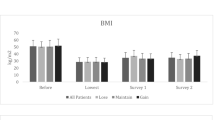Background
Weight loss outcome predictions after gastric bypass (GBP) surgery based on individual findings have shown relatively little consistency. The present study took a more comprehensive approach, utilizing extensive pre-surgery interview and psychological test data both individually and in composite predictors.
Methods
Pre-surgery data were obtained for 131 morbidly obese patients on a 273-item interview and 5 psychological assessment instruments, and weight loss measures (simple weight change and BMI change) were obtained at a mean of 12.8 months following surgery.
Results
Individual predictor variables based on existing research findings showed expected but mostly nonsignificant correlations with weight loss. Optimal composite predictor variables were constructed for 4 general areas of pre-surgery assessment as represented in the literature: physical/medical health, psychological health, interpersonal support, and eating disorder. Each composite variable significantly predicted weight loss, and together they showed multiple correlations of .50 with simple weight change and .54 with simple BMI change.
Conclusions
Sustained weight loss after GBP was related to a rather wide range of pre-surgery variables, each of which made a small contribution, but composite variables grounded in the general literature provided more effective prediction. It is cautioned that continued success after ≥2 years could be dependent on yet other variables, with a possible contribution from some post-surgery factors.
Similar content being viewed by others
References
Bocchieri LE, Meana M, Fisher BL. Perceived psychosocial outcomes of gastric bypass surgery: A qualitative study. Obes Surg 2002; 12: 781–8.
Buchwald H, Avidor Y, Braunwald E et al. Bariatric surgery: A systematic review and meta-analysis. JAMA 2004; 13: 1724–37.
Herpertz S, Kielmann R, Wolf AM et al. Do psychosocial variables predict weight loss or mental health after obesity surgery? A systematic review. Obes Res 2004; 12: 1554–69.
van Hout GCM, Verschure KM, van Heck GL. Psychosocial predictors of success following bariatric surgery. Obes Surg 2005; 15: 552–60.
Lanyon RI, Maxwell B, Karoly P et al. Utility of the Multidimensional Health Profile — Psychosocial Functioning Scales (MHP-P) for assessing psychosocial adjustment in gastric bypass surgery patients. J Clin Psychol Med Settings 2006; 13: 57–66.
Butcher JN, Dahlstrom WG, Graham J et al. MMPI-2: Manual for Administration and Scoring. Minneapolis: University of Minnesota Press, 1989.
Jackson DN. Basic Personality Inventory: Manual. Port Huron, MI: Sigma Assessment Systems, 1989.
Beck AT, Steer RS, Garbin MG. Psychometric properties of the Beck Depression Inventory: Twenty-five years of evaluation. Clin Psychol Rev 1988; 8: 77–100.
American Psychiatric Association. Diagnostic and Statistical Manual of Mental Disorders-IV-TR. Washington, DC: APA, 1964.
Karoly P, Ruehlman LS, Lanyon RI. The assessment of adult health care orientations: Development and preliminary validation of the Multidimensional Health Profile — Health Functioning Index (MHP-H) in a national sample. J Clin Psychol Med Settings 2005; 12: 79–91.
Ruehlman LS, Lanyon RI, Karoly P. Multidimensional Health Profile: Professional manual. Odessa, FL: Psychological Assessment Resources, 1998.
Ruehlman LS, Lanyon RI, Karoly P. Multidimensional Health Profile: Scoring and Interpretive Program (Windows Version 1.0). Odessa, FL: Psychological Assessment Resources, 1998.
Ruehlman LS, Lanyon RI, Karoly P. Development and validation of the Multidimensional Health Profile, Part I: Psychosocial Functioning. Psychol Assess 1999; 11: 166–76.
Lanyon RI, Maxwell B., Karoly P et al. Utility of the Multidimensional Health Profile — Health Functioning Scales (MHP-H) for assessing health related functioning in gastric bypass surgery patients. J Clin Psychol Med Settings (in press).
Averbuhk Y, Heshka S, El-Shoreya H et al. Depression score predicts weight loss following Roux-en-Y gastric bypass. Obes Surg 2003; 13: 833–6.
Dubovsky S, Haddenhorst A, Murphy J et al. A preliminary study of the relationship between preoperative depression and weight loss following surgery for morbid obesity. Int J Psychiatry Med 1985; 15: 185–96.
Hafner RJ, Rogers J, Watts JM. Psychological status before and after gastric restriction as predictors weight loss in the morbidly obese. J Psychosom Res 1990; 34: 295–302.
Author information
Authors and Affiliations
Corresponding author
Rights and permissions
About this article
Cite this article
Lanyon, R.I., Maxwell, B.M. Predictors of Outcome after Gastric Bypass Surgery. OBES SURG 17, 321–328 (2007). https://doi.org/10.1007/s11695-007-9059-5
Received:
Accepted:
Published:
Issue Date:
DOI: https://doi.org/10.1007/s11695-007-9059-5




